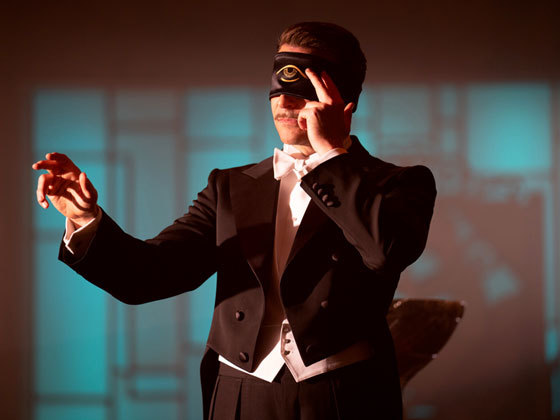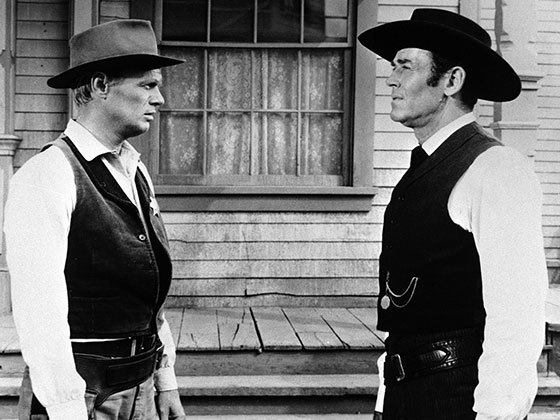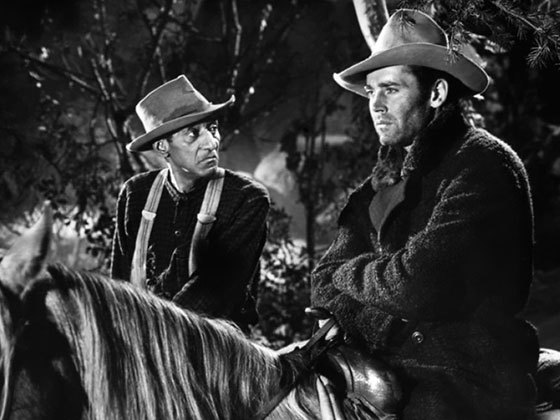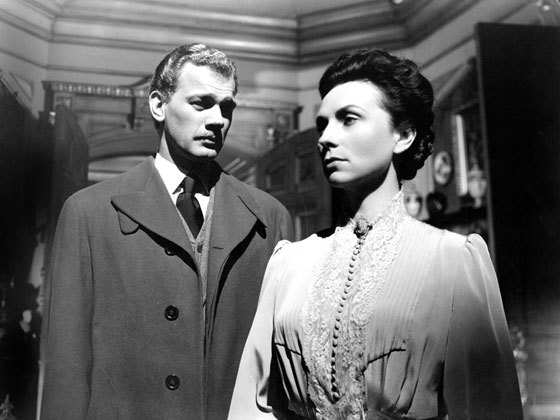By Michael Sragow
After Citizen Kane, Hollywood’s youthful maverick paid brilliant tribute to Booth Tarkington, with a Thornton Wilder touch.
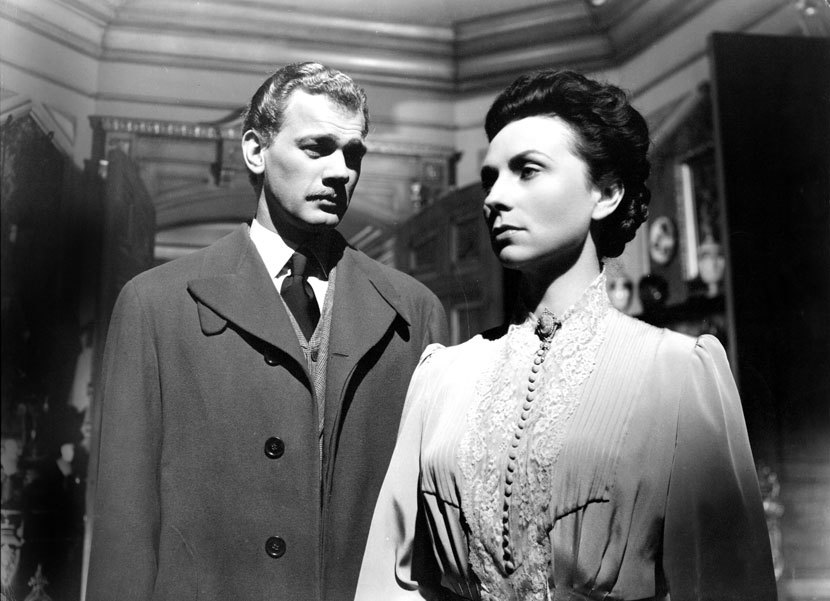
Based on Booth Tarkington’s 1918 novel about a wealthy midwestern clan that lives large and deteriorates with the coming of the automobile, Orson Welles’s The Magnificent Ambersons (1942) moves from intimate nostalgia to wrenching pathos and black comedy. It’s a period piece with the emotional charge of a recovered memory and the cultural resonance of a collective memory. While staying astonishingly faithful to the book’s nimble prose and engaging dialogue (it unfolds in an unnamed, fictionalized version of Indianapolis), Welles heightens the story’s impact with the inventive eclat of his theatrical imagination. The result does for mid-size cities what Thornton Wilder’s Our Town (1938) does for villages. It turns a particular history of a specific way of life into a shared remembrance of things past. Truncated by a nervous studio (RKO) that also imposed a rushed and sentimental ending, the film nevertheless sustains a yearning, tragicomic aura. Under its spell we feel part of a generation that has time for “sleigh rides, and balls, and assemblies, and cotillions, and open house on New Year’s,” before the exploding car culture teaches us that “the faster we’re carried, the less time we have to spare.”
Welles rarely connected more closely to his source material. In This is Orson Welles (1992), the director tells Peter Bogdanovich that his father was “a friend of Tarkington’s,” and that “there really is a lot of my father” in the character of Eugene Morgan, “an early automobile fellow with a deep suspicion of what the automobile would do.” Dick Welles was an important innovator in the car lamp industry and a partner in a Kenosha, Wisconsin headlight company. Earlier, as a road representative for a bicycle company, he often visited Chicago, where he would rub elbows with visiting cultural figures like Tarkington, Indiana’s favorite son. As played by Joseph Cotten, Eugene sums up the keenest attributes of forward-looking Americans: a sleek yet homespun attractiveness and a rambunctious drive and spontaneity, modulated by respect for old-fashioned beauty.
Over the course of the film, Eugene’s success deflates the Ambersons’ grandeur and puts their aspirations toward becoming American nobility into stark relief. The patriarch, Major Amberson (Richard Bennett), a veteran of Gettysburg, made his fortune during the Panic of 1873, “buying and building and trading and banking.” Daughter Isabel (Dolores Costello), admired as a gracious, “delightful looking young lady,” rejects Eugene after he drunkenly smashes his bass viol on her front lawn during an aborted serenade. Instead she marries bloodless businessman Wilbur Minafer (Don Dillaway), then lavishes her passion on their only child, George (Tim Holt), who views himself as an aristocrat and acts like a spoiled brat. Wilbur’s live-in sister, Fanny (Agnes Moorehead), who pined for Eugene as a girl, fantasizes about winning him when he returns to town as a budding auto tycoon and widower. Moorehead, a standout, delivers a superbly disturbing performance, revealing Fanny’s primal horror of turning into someone else’s stereotype of a spinster aunt. Holt has been criticized as a cowboy actor unsuited to play an elitist snob, but he fits the “stalwart” side of Tarkington’s George perfectly. Welles had played the role himself, stridently, in his 1939 Campbell Playhouse radio production, costarring Walter Huston as Eugene. At the start of his career, Welles was known from his broadcast and stage work and then from Citizen Kane as an actor-manager, galvanizing his Mercury Theatre troupe from within. Some critics and biographers have theorized that the novel’s portrait of a doting mother and her son would have been too close to the auteur’s own childhood for Welles to play George comfortably. Welles said his mother was actually “rather austere with me.” He may have calculated that performing as narrator and protagonist would confuse the movie’s audience. (He played George at high pitch in his broadcast and it sounded peculiar and grating.) At any rate, in this production, narration is paramount.
This tale of two families warped by the hazards of new and aging fortunes advances in stages until genial social satire becomes mordant psychological drama. George’s disdain for work and general obliviousness alarm his romantic ideal, Lucy (Anne Baxter), Eugene’s perceptive daughter. As the Major loses track of his investments in a rapidly industrialized world, George becomes possessed by the notion that Eugene and Isabel reigniting their old flame could be a scandal that would destroy the family. He’s stuck in an Oedipal bind within a genteel bubble. The only character who glides serenely through these conflicts is Isabel’s brother and Morgan’s best friend, Congressman Jack Amberson (Ray Collins), who epitomizes the “hail fellow well met.”
Welles lifts it all to a lyrical plane. His voiceover serves the same function as the Stage Manager’s direct address to theatergoers in Wilder’s Our Town. He transforms mundane observations into the stuff of American dreams and nightmares and sets the standard for everything else in the film. Even with their most daring designs gutted or chopped up, Welles’s alternately elegant and trenchant mise en scene and the coruscating camerawork (mostly by Stanley Cortez) encompass languid, seductive views of gracious living and a geometric dissection of the Amberson household as upscale American Gothic.
| READ THE NOVEL |
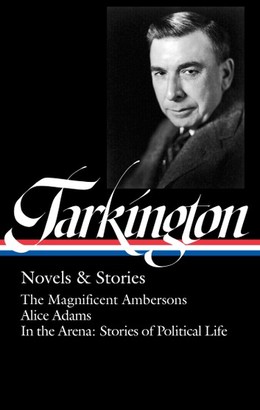 |
| in Booth Tarkington: Novels & Stories |
The director knew both Wilder and Tarkington inside-out. As Patrick McGilligan records in his enthralling biography Young Orson (2015), it was Wilder who encouraged an eighteen-year-old Welles to make his living as an actor, then wrote letters of introduction to New York stage divinities such as star-producer Katherine Cornell. Fellow Wisconsinites (Wilder was born in Madison in 1897, Welles in Kenosha in 1915), they were each destined to concoct vital blends of classical drama and modernist storytelling. Welles’s bold use of narration in The Magnificent Ambersons echoes Wilder’s calm audacity with the Stage Manager, a figure connected equally to the ensemble, to the audience, and to the imaginative content of the play (he sets the stage for each act). The Stage Manager raises a seriocomic vision of Yankee mores into a profound vision of love and death from the altar and the kitchen to the grave—just as Welles’s narrator elevates Tarkington’s nostalgia-charged realism into sardonic fable. How close is the connection? Wilder often performed the Stage Manager. Welles did, too, when he directed Our Town’s first radio production, in 1939. Five months later he guided his Mercury Theatre players through that erratic radio version of Ambersons, in which he played George (poorly) and read the narration (proficiently). When Welles was still riding high on the excitement of Citizen Kane (1941), he wrote this screenplay. He figured out how an omniscient narrator could sound friendly, candid, ironic, and ultimately bardic—like a true voice of America.
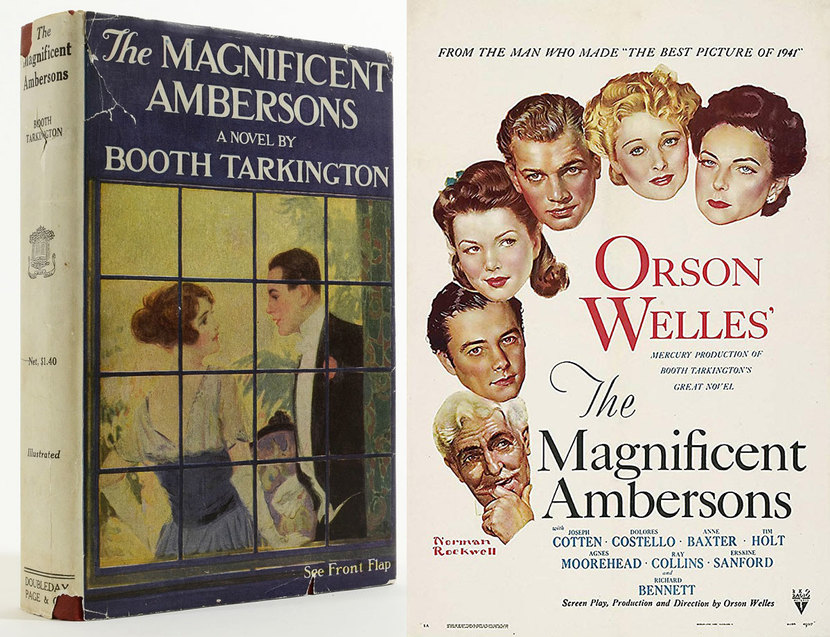
So we feel part of a fully populated, intricate world even before the narrative begins. Tarkington’s words, as honed by Welles, slide us into a way of life founded partly on appearance, and Welles’s elastic rhythms and relaxed, subtly varied tones envelop us from his opening declaration that the Ambersons’ “splendor lasted through all the years that saw their Midland town spread and darken into a city.” The nine-minute introduction segues into Currier and Ives tableaux—with a difference. Performers scurrying inside the picture-book frames infuse old-fashioned images with vaudevillian electricity. While the narrator waxes nostalgic about a time when “the only public conveyance was the street car,” we see it skid off the tracks, the males help the female passengers debark, and then all of them re-board after the men hoist it back on. In flurries of deft audiovisual byplay between Welles and his ensemble, other characters make cameos as sidewalk commentators or pop up in sharp vignettes that dramatize changing fashions and the Ambersons’ renown—and the deepening haughtiness of George, the heir apparent.
Forthwith Welles intones that a holiday ball thrown in George’s honor during his college sophomore year “was the last of the great, long-remembered dances that ‘everybody talked about.’” That sentiment wafts off the narration in sync with the graceful moving camera that promenades us into the Ambersons’ showplace mansion. Even in woefully abridged form (studio editing shaved a third of its original fifteen-minute running time), this virtuoso sequence brilliantly depicts an entwined social and family life at its height—just before the fall. This familial mini-spectacle is right up there with the ball in Visconti’s The Leopard and the wedding in Coppola’s The Godfather.
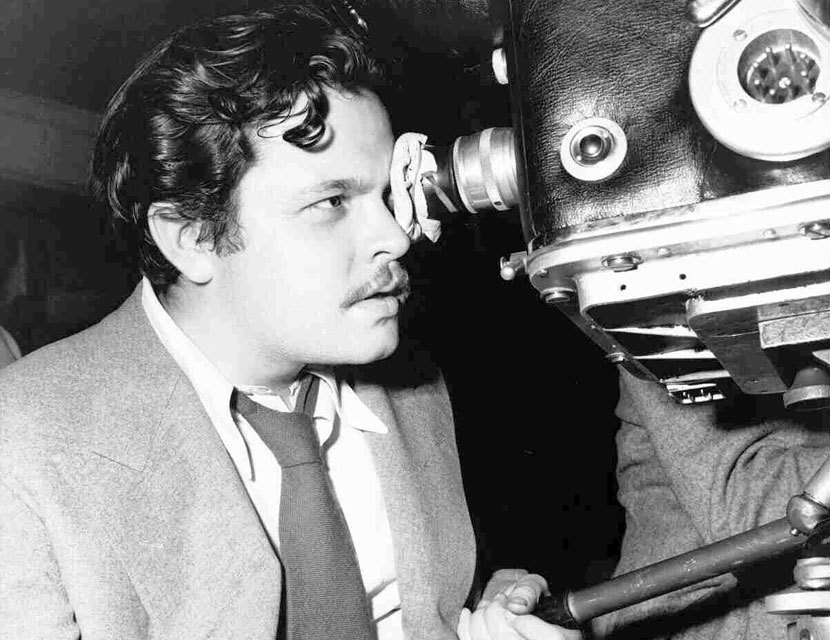
Despite some bumps and elisions, the film’s first third remains pure poetry, including a magical jaunt through a picturesque snowscape in horse-drawn cutter (George and Lucy) and horseless carriage (everyone else). The rest of the film unfolds in supple, expressive prose that can’t as easily transcend the narrative holes that emerged from RKO eliminating fifty minutes of Welles’s footage. The transformation of the Ambersons’ environment—due to mechanization, urban sprawl, and older families feeling the pinch and selling off their properties—gets relegated to snips of conversation and George’s impressionistic walk through town after the dynasty has crumbled. The shifts in the balance of power between Eugene’s love for Isabel and George’s hold over her feel abrupt and unearned. The studio trashed Welles’s design for a complex denouement that would do justice to Eugene and Isabel’s love story while acknowledging Fanny’s pained resignation. Still, performers like Bennett, Moorehead, and Cotten maintain their pull on our imaginations. So do the remains of Welles’s coups de cinema, such as the piercing closeup of Bennett’s dying Major sitting at his fireside. The reflected blaze licks the furrows of his face as he ponders his entrance into “an unknown country, where he was not even sure of being recognized as an Amberson.”
Two-thirds of the way in, Welles seems to throw the film to Cotten, making Eugene the central consciousness of the movie. Cotten delivers an inspired reading of one of the most eloquent speeches in American movies. In response to George declaring that automobiles “had no business to be invented,” Eugene says:
I’m not sure George is wrong about automobiles. With all their speed forward they may be a step backward in civilization. It may be that they won’t add to the beauty of the world or the life of men’s souls. I’m not sure. But automobiles have come, and almost all outward things are going to be different because of what they bring. They’re going to alter war, and they’re going to alter peace. And I think men’s minds are going to be changed in subtle ways because of automobiles. And it may be that George is right. It may be that in—ten or twenty years from now, if we can see the inward change in men by that time, I shouldn’t be able to defend the gasoline engine, but would have to agree with George that automobiles ‘had no business to be invented.’
Ambersons’ infamous previews, editing controversies, and box-office failure derailed Welles’s Hollywood career. There would be masterpieces of different kinds to come, including his feral thriller Touch of Evil (1958). But he made most of his major work, like his robust, visionary Falstaff film, Chimes at Midnight (1965), independently and/or abroad. He lost his power to use a studio’s vast creative tools to explore subjects he knew from the ground up, on his native land.
What America lost was an artist who could embrace our country’s contradictions and synthesize them into a thing of beauty, as he does in The Magnificent Ambersons. This movie about the Ambersons’ illusory perfection is as beguiling and mournful as the Emile Waldteufel waltz that Bernard Herrmann uses to punctuate the score: “Toujours ou Jamais”—“Always or Never.”
Via TCM: 1942 trailer for The Magnificent Ambersons (2:12)
The Magnificent Ambersons (1942). Directed by Orson Welles. Written by Orson Welles, from Booth Tarkington’s novel. With Joseph Cotten, Agnes Moorehead, and Tim Holt.
Buy the Criterion Collection DVD • Buy the Criterion Collection Blu–Ray • Watch on Amazon Video • Watch on iTunes • Watch on Vudu • Watch on YouTube
Michael Sragow edited the Library of America’s two volumes of James Agee’s prose. He is the author of Victor Fleming: An American Movie Master and a Contributing Editor and online critic for Film Comment.

